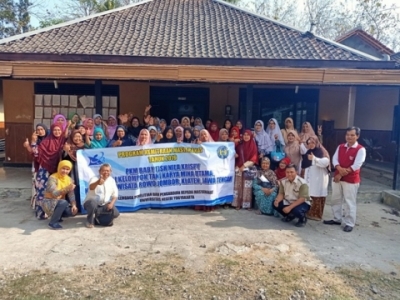COMMUNITY SERVICE PROGRAM FOR FISH FARMING GROUP AT ROWO JOMBOR

Dr. Nani Ratnaningsih, S.T.P., M.P., dr. Tutiek Rahayu, M.Kes., and Dr. Mujiyono, S.T., M.T., W.Eng through Community Partnership Program 2019 supported by Directorate of Research and Community Service, the Ministry of Research and Higher Education conducted community service activities to improve the quality of crispy Nile Tilapia baby fish produced by Tani Karya Mina Utama Group at Rowo Jombor, Klaten Central Java. This program hopefully will improve the quality of crispy Nile Tilapia baby fish as special food souvenir from Rowo Jombor and improve the community economy and support government program to eat fish more.
As a center for freshwater fish culinary, Rowo Jombor, located in Krakit Village, Bayat District, Klaten Regency also launched the “Love to Eat Fish” movement. Fish farmers in Rowo Jombor harvest the fish every 3 to 4 months and produce around 4 to 5 quintal of fish for each pond. In Rowo Jombor there are 454 fish farmers, so it is estimated that the fish yield is around 168,556 tons per year. Many fish farmers in Rowo Jombor choose the cultivation of red tilapia, black tilapia, catfish, catfish and carp.
The cultivation of baby tilapia is more profitable compared to large size tilapia, because baby tilapia fish are sold at Rp. 17,000 per kg, while the price of bigger tilapia (around 300 to 500 grams) is only Rp. 20,000-Rp. 22,000 per kg. The baby fish business prospect is bright. Baby tilapia cultivation only needs short term care while the selling price of frozen baby fish in supermarkets and on the public market can reach Rp 50,000 per kg. For the price of crispy fried tilapia baby fish may ranges from Rp. 80,000 to Rp.100,000 per kg (Suryaningrum et al., 2015) and in online stores (Tokopedia, Lazada, and Bukalapak) around Rp.100,000 to Rp. 200,000 per kg.
Unfortunately, current crispy Nile Tilapia baby fish product still have low quality due to lack of processing standard, simple packaging and labeling. It’s oily feature cause the product easily turned rancid and having short term durability. As a solution to the problem, UNY's lecturer team improved the standard of the production process of tilapia krispi baby fish, and improved packaging and labeling according to BPOM regulations. Modification of the spinner machine is done by installing a dimmer. This dimmer functions to regulate the speed of the spinner when draining oil from fried tilapia chips. The speed regulation of the spinner machine is very important because it can affect the integrity of the shape and savory taste of the crispy tilapia.
The improved product is packaged in a 200 gram plastic pouch with Krispi Rojo brand applied. Rojo is an abbreviation of Rowo Jombor. The packaging is completed with nutritional information, Halal certificate number, and expiry date. (hryo; Tj.Lak)

